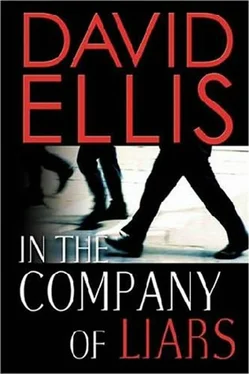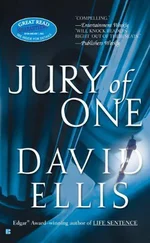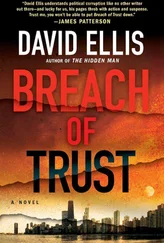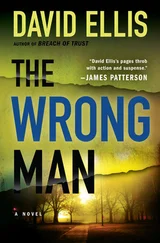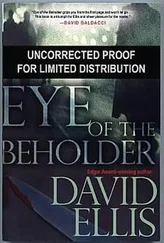McCoy shakes her head. “It’s not like that. You won’t hear her say a thing like that at trial. If she discloses a single witness that makes your hair stand up, let me know. But she won’t, Roger. She won’t do that.”
“She won’t,” he says, “because she wouldn’t be dumb enough to admit to something like that at trial?”
McCoy doesn’t answer.
“Or she won’t,” Ogren continues, “because she doesn’tknow?”
McCoy smiles. A quick study, this one. “She won’t, period.” She gathers her bag and heads for the door. “You’re on the right track with your case,” she says. “The rest of this is way out there, totally peripheral. It has nothing to do with your prosecution. Okay?”
Ogren seems to be temporarily placated, but overall, he is still probably feeling very much in the dark.
“Pull that deleted document off her hard drive,” she says. “You’ll like what you find.” She shows herself out. It is a bit troubling to her that she is getting good at this.
ONE DAY EARLIER
MONDAY, MARCH 22
Ron McGaffrey sits in Allison’s home, on her burgundy couch in the living room. He just received the files from the case-a case he had undoubtedly read about, a case about which he has probably foamed at the mouth for the chance to defend. So enamored was he with the prospect of being Allison’s lawyer, he has paid her a call at her home. He read over the file this past weekend, he has told her, and she listens to him complete his assessment of the case.
“The case is a classic circumstantial prosecution,” McGaffrey summarizes. He is leaning back on the couch, an ankle crossed over the other knee, waxing eloquent as lawyers often do.
“You were there, at some point,” he says. “You broke a nail. You lost a strand of hair. Lost an earring. You were there. It doesn’t mean you were there on thenight he was murdered. ”
But itdoes mean she was there, at some point. She told the police that she was not romantically involved with Sam Dillon. She has no other explanation for why she would have visited Sam Dillon’s home by the lake.
“The blood on your sweatshirt is a bit troubling,” McGaffrey concedes. “But it’s not consistent with a spatter. It’s not very much blood. It could have come at other times, too.” He looks at Allison. “A nosebleed, perhaps. Something that just trickled on your sweatshirt.”
Allison nods.
“If you had a friendship with Dillon, or some other kind of relationship,” McGaffrey says, “that is an explanation for all of this. It doesn’t put you at his house on the night of the murder. The last time you saw him was when you went to his office at the state capital.”
Allison winces. It is hard not to think about the last time she saw Sam Dillon.
At that moment, she was sure that she loved him. At the moment that he was gone, her feelings for Sam crystallized, moved from an intense passion, from her reawakening of feelings dormant for so many years, to love.
“I love you,” she said to him. She reached for him but it seemed inappropriate. Her hand was only inches from his head, from the blood that caked the back of his beaten skull. She wanted him to see her one more time, even if he couldn’t see her. She wanted to look into his eyes, but she would not move him. His face was peaceful, defeated, his eyes closed but his mouth open ever so slightly.
She picked up the trophy from the manufacturers’ association and placed it in a plastic freezer bag from Sam’s kitchen.
“You weren’t there,” McGaffrey repeats, as if to convince himself. “And then there’s the issue of your meeting with Sam at the state capital the day before he died. Friday. They’re saying he ended your relationship and you were furious. This is based only on your appearance-you seemed upset-and a few words from Dillon to you that were overheard. This is based on one person’s brief overhearing of a part of a conversation that he knew he wasn’t supposed to be overhearing. Reliability is a question.”
Allison nods, as if she is on board. But the staff aide heard it accurately, more or less.
“This isn’t going to work out,” Sam said, sitting behind his desk at the capital, a hand on his forehead, looking into Allison’s eyes.
“Mat-Mat’s a friend. You know this is crazy. It always was.”
McGaffrey puts on his reading glasses and looks over some notes on a pad, undoubtedly notes from the transcript of the preliminary hearing, the testimony of the aide who overheard part of their conversation. “ ‘It isn’t going to work out. Mat’s a friend. This is crazy. You know that.’ ” McGaffrey looks at Allison. “These are words susceptible to more than one meaning.”
“Okay,” Allison says. “Good.”
“A silver Lexus sport utility vehicle drove to Dillon’s house after one in the morning,” he continues. “The witness didn’t see the plates. I would expect that Lexus sells quite a lot of those in these parts.”
“I would think so.”
“Who has keys to your car, Allison?”
“Just me.”
“Not your ex-husband?”
Allison shakes her head. “I bought it after we separated.”
“What about your daughter?”
“No, Ron. Just me. But like you said, there are lots of Lexus SUVs out there.”
He nods, but he was hoping for something better. “And that’s their case.” The lawyer tosses the transcript on the couch. “At least so far. They have no murder weapon. They have no eyewitness. And there’s some question about time of death.”
“Not in the state’s opinion, there isn’t.”
“No, that’s right. They have him getting food delivery at six-twenty or so, and partial digestion suggests he died about forty-five minutes later. Assuming he ate the food when it arrived, that means seven o’clock, more or less. They have the clock used to hit Dillon over the head that broke, that was frozen at 7:06 p.m. And the rate of decomp suggests around seven, too.”
“I can say I was home at seven,” she says.
“Right. And then there’s this whole thing about the trip to Dillon’s house at one in the morning. The e-mail sent from his computer. An e-mail sent to you, by the way. That’s a wild card.”
“What do you mean by that?” she asks.
“Well.” He opens his sizable hands. “If Dillon sends an e-mail at one in the morning, it means he’s alive. That doesn’t square with time of death, six hours earlier. They’ve got to be wondering about that. If they have you as the suspect, then they figure you went back there, too, and you sent the e-mail. But why? It doesn’t make sense. You have an alibi for seven. You were home. Not that anyone can corroborate that.”
“No.”
“But still. It’s not a bad alibi. So why go back? And why send the e-mail toyourself? You’re putting up a red flag. You’re saying, ‘Hey, look at me.’ If you’re smart enough-diabolical enough-to make a premeditated trip back to his house, why leave a calling card?”
She was lucky, she thought, though lucky hardly seemed the word, that Sam did not use a password to protect his screen saver, because she certainly couldn’t ask him for the password now. The screen was black with asteroids and stars moving about, probably the standard screen saver-Sam barely had learned how to use his computer, he surely hadn’t formatted his own screen saver-but with one push of the computer mouse, the screen returned to his e-mail in-box. She hit the “compose” icon and pulled up a blank mail message. She typed in the words and addressed the message to her own web address,allison@allisonpagone.com:
Need to discuss further. Getting worried. Many would be unhappy with my info. Need advice ASAP.
She sent the e-mail and checked her watch. It was close to twenty after one. Having sat down for even a minute, she felt intense exhaustion sweep over her. But she resisted. Now was no time to get weary. She only had to get back home now-yes, that included having to pass Sam’s body downstairs one more time-and she would be safe.
Читать дальше
